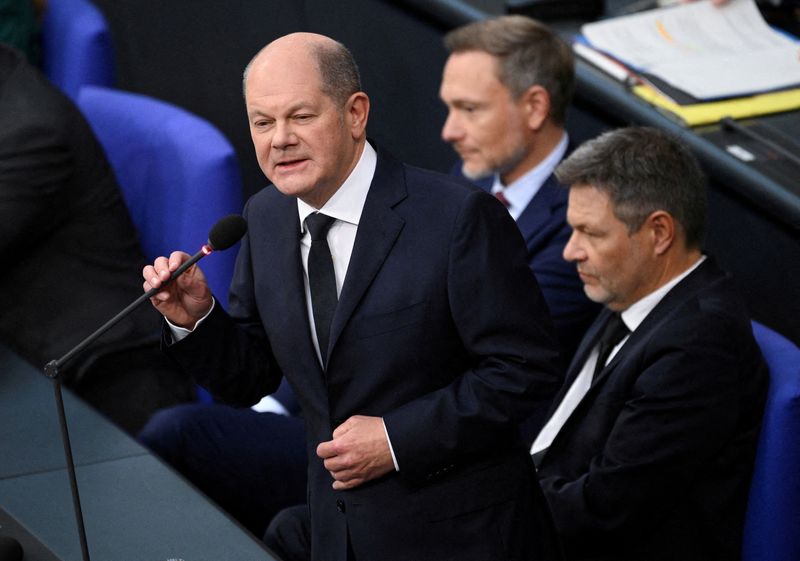By Christian Kraemer
BERLIN (Reuters) - Germany's ruling coalition unveiled a supplementary budget on Monday that will temporarily lift a self-imposed cap on borrowing after a constitutional court ruling tore up the government's spending plans.
The budget, which parliament must approve, will see Germany suspend its constitutionally enshrined debt brake for a fourth year in a row to borrow roughly an extra 45 billion euros ($49 billion) as Chancellor Olaf Scholz's government fights its way out of a crisis that has triggered warnings about growth and an industry exodus.
Berlin was forced to freeze most new spending commitments after the court blocked plans to re-purpose billions of euros of unused pandemic funds towards green projects and industry subsidies.
It will suspend the debt brake for the 2023 budget to allow higher borrowing prompted by the court's ruling, before finalising a 2024 budget that could see cuts in some ministries in order to keep spending commitments elsewhere.
The brake sets a limit on new borrowing, though it can be exceeded in "exceptional" circumstances.
Friedrich Merz, who leads the resurgent opposition Christian Democratic Union party that launched the initial lawsuit before the constitutional court, warned that fresh legal action was possible should the government seek to suspend the debt brake for next year's budget, too.
"We have no confidence," he said.
The government said the spillover effects from the energy crisis that hit in 2022 after Russia's invasion of Ukraine and caused rocketing prices had created an emergency situation that justified suspending the debt brake.
"There was and is a risk that falling household consumption could trigger a downwards spiral in the German economy, causing significant declines in prosperity and employment," the draft law said in its justification.
The new borrowing will not fully cover the 60 billion euro hole blown in the budget by the court ruling: 2023 expenditures will fall by 15.1 billion euros, but the government said this would be sufficient to cover all commitments.
Time was now running out for parliament to approve a 2024 budget this year, meaning this could get delayed until the end of January, a government spokesperson earlier said.
COMPANIES WORRIED
The leader of Scholz's SPD urged the government to consider suspending the debt brake next year, a move rejected in particular by the fiscally hawkish Free Democrats (FDP).
"We don't have a revenue problem," FDP parliamentary group leader Christian Duerr said. "The debt brake must remain."
FDP General Secretary Bijan Djir-Sarai, in remarks to the broadcaster ZDF, on Monday also spoke out against reforming the debt brake, a move that has found growing support elsewhere in the wake of the crisis.
The court ruling has called into question Germany's traditionally strict fiscal policy and sparked warnings that German companies could be starved of support to keep them globally competitive.
Germany has by far the lowest debt in the G7 grouping of major economies, but memories of how frugality paved the way for postwar reconstruction and how costly it was to re-integrate indebted ex-communist East Germany have shaped a uniquely debt-averse political culture.
A spokesperson said the government believed the latest budget measures were on a sound legal footing but could not rule out another legal challenge.
The conservatives, who brought the original challenge, have said they will not do so again.
In order to keep backing industry, Finance Minister Christian Lindner from the FDP has ruled out tax rises and said savings would have to be found elsewhere, backed up by reforming the welfare state.
The debt brake, introduced after the global financial crisis of 2008-2009, was first suspended in 2020 to help the government support firms and health systems during the COVID-19 pandemic.
Economy Minister Robert Habeck, from the Greens, has criticised the debt brake as inflexible and as blocking vital support for industry to stop jobs and value creation from moving abroad.
On Monday he stressed the need to give companies, which have been worried by the uncertainty caused by the budget crisis, clarity as quickly as possible.

"We can't waste a lot of time," he said, adding it was not clear whether the government would extend an energy price cap that supports industry into next year.
($1 = 0.9168 euros)